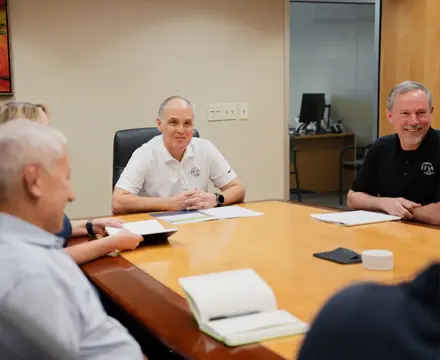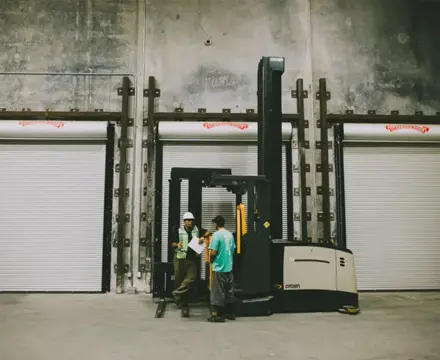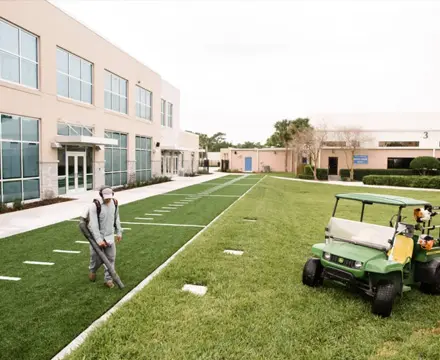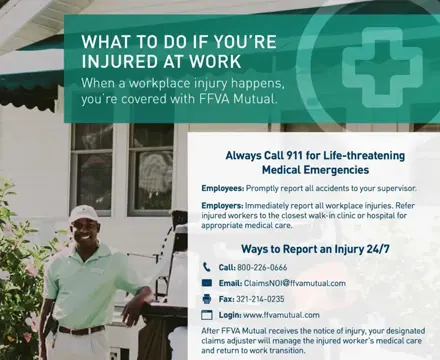When a workplace injury happens, one of the first questions is, “What does workers’ comp cover?” For both employers and employees, the answer can impact everything from financial planning to job security. Understanding the scope of workers’ compensation coverage isn’t just a legal necessity — it’s critical for building a safer, more stable workplace.
Workers’ compensation insurance provides support when an injured worker needs it most. It offers protection against high medical expenses, helps replace lost wages and ensures access to recovery resources. Just as importantly, it shields business owners from lawsuits and unexpected liabilities.
At FFVA Mutual, we specialize in delivering comprehensive, proactive workers’ compensation insurance for today’s dynamic workforce. This guide explains what’s included in most workers’ comp policies, what’s excluded and how to ensure your business insurance is doing its job.
What Is Workers’ Compensation?
Workers’ compensation is a form of insurance coverage that benefits employees who suffer a work-related injury or develop an occupational illness due to their job duties. These benefits may include payment for medical treatment, partial wage replacement and even vocational rehabilitation if a return to the previous role isn’t possible.
This system operates under a no-fault structure — meaning it doesn’t matter who caused the workplace accident. If the injury occurred on the job, the employee receives benefits, and the employer is typically protected from a lawsuit.
Each state manages its own system, but workers’ compensation insurance is mandatory for most companies with employees. The only exception is Texas, where private employers may opt out.
Why Workers’ Comp Coverage Matters
Operating without workers’ comp coverage isn’t just risky — it’s expensive. A single workers’ compensation claim for a severe injury could exceed six figures in medical costs and wage replacement. Without compensation insurance, those expenses fall directly on the business.
There’s also the legal risk. In many states, failure to carry workers’ compensation coverage can result in fines, criminal penalties or forced business closure.
Beyond compliance, a well-managed workers’ comp insurance policy supports a faster, smoother recovery for the injured worker. This improves morale, reduces turnover and can limit the indirect costs of injury, like productivity loss and re-training.
Building a strong safety culture is one of the best ways to reduce claims frequency and strengthen your team.
What Workers’ Compensation Typically Covers
Coverage can vary slightly depending on your state and policy, but here’s what’s typically included under most workers’ comp insurance plans:
Medical Expenses
Any necessary treatment resulting from a workplace injury or illness is usually covered. This can include:
- Emergency room visits and hospital stays
- Doctor visits, diagnostics and imaging
- Prescriptions and medical devices
- Physical therapy and post-operative care
- Travel to and from appointments (in some states)
Only authorized medical providers approved by your insurance carrier or the state’s compensation board are typically eligible for reimbursement.
Lost Wages
If an injured employee can’t work while recovering, workers’ comp benefits may include partial wage replacement. These benefits usually equal a percentage (often two-thirds) of the employee’s average weekly earnings, subject to minimums and maximums.
- Types of wage loss benefits include:
- Temporary Total Disability (TTD)
- Temporary Partial Disability (TPD)
- Permanent Partial or Total Disability
Some states offer waiting periods or retroactive eligibility rules that affect when wage replacement begins.
Vocational Rehabilitation
When a worker is unable to return to their original job, vocational rehabilitation helps them find new employment. Services may include:
- Resume assistance
- Job placement support
- Technical training
- Tuition for re-education
These benefits are particularly valuable in industries with physically demanding roles or an aging workforce.
Disability Benefits
If an injured worker has a long-term or permanent impairment, disability benefits help offset the impact on their future earnings. These may be structured as lump-sum or ongoing indemnity benefits, depending on the severity and duration of the disability.
Death Benefits
If a work-related injury results in an employee’s death, workers’ compensation insurance pays death benefits to eligible dependents. These payments may cover:
- Funeral expenses
- Weekly income support for surviving spouses or children
- Long-term financial assistance in some cases
Learn more in this workers’ comp benefits post.
What Workers’ Comp Does NOT Cover
Not every injury is covered, and it’s important for employers to know where workers’ compensation coverage draws the line.
Off-the-Job Injuries
If the injury occurred while the employee was off duty, commuting or engaging in personal activities, it generally won’t be covered — even if the injury affects work performance later.
Self-Inflicted Injuries
Intentional harm, horseplay or injuries resulting from misconduct may be excluded. If the insurance company determines the injury was not accidental, workers’ comp benefits can be denied.
Injuries from Illegal Situations
If the injured worker was under the influence of drugs or alcohol, violating company policy or committing a crime, workers’ compensation laws may not require coverage.
Who Qualifies for Workers’ Comp Coverage?
Most workers’ comp policies automatically cover:
- Full-time and part-time employees
- Seasonal workers
- Temporary staff in some states
Excluded groups often include:
- Independent contractors
- Sole proprietors without employees
- Domestic workers (in some states)
- Certain volunteers
Classification issues can lead to denied claims or audits. That’s why FFVA Mutual works closely with employers to identify proper roles and ensure workers’ compensation coverage applies to the right people.
Choosing the Right Workers’ Comp Policy
The effectiveness of your workers’ compensation insurance depends on how well it’s tailored to your business. Key questions to consider:
- Does the policy reflect your current headcount and job duties?
- Are independent contractors properly classified?
- Have your payroll or risk levels changed?
- Are you working with a responsive insurance carrier that understands your industry?
At FFVA Mutual, we don’t just provide compensation insurance; we partner with employers to build smarter, safer workplaces. Our team is here to answer your questions and review your current workers’ comp insurance policy for potential improvements.
Ready To Protect Your Team?
Workers’ compensation coverage plays a vital role in every organization’s risk strategy. It protects your people, ensures compliance and helps keep your business running smoothly.
Whether you’re navigating a workers’ comp claim, adjusting your policy or looking for ways to reduce costs, FFVA Mutual is here to help you better understand how workers’ comp works. Let’s make sure your team is covered from every angle. Request your workers’ comp quote now.






























